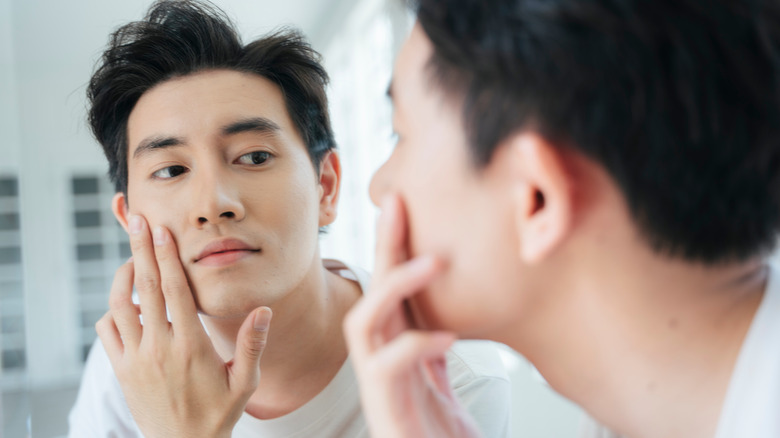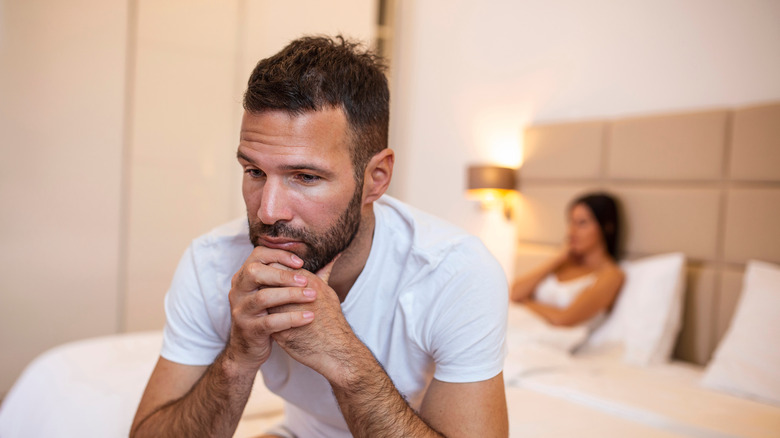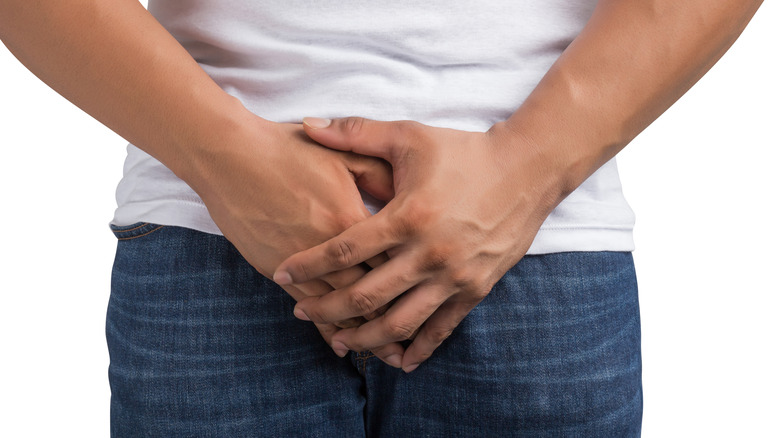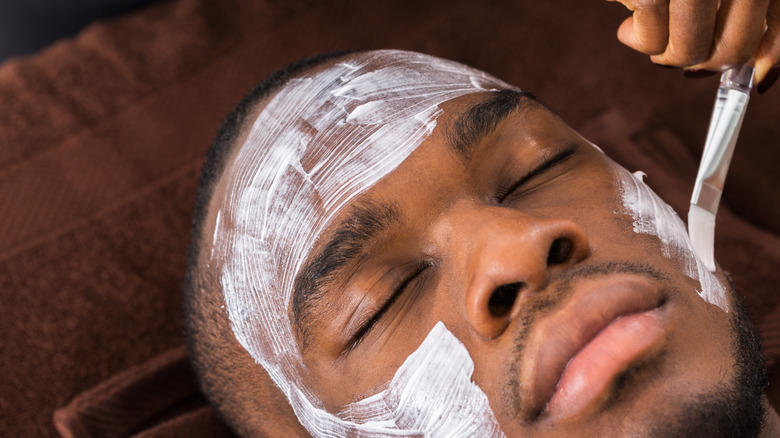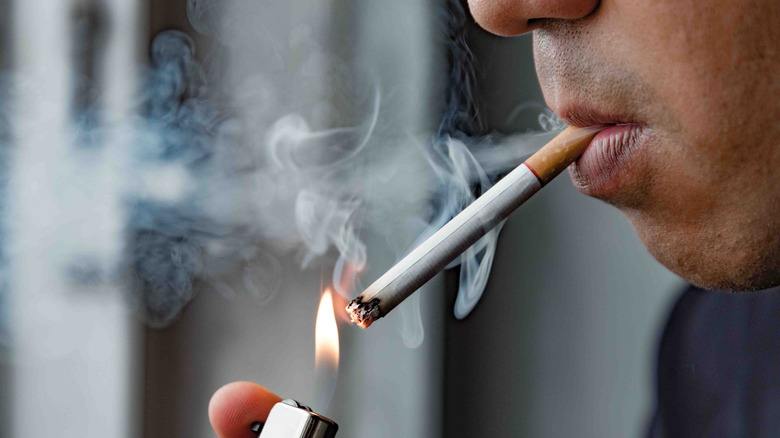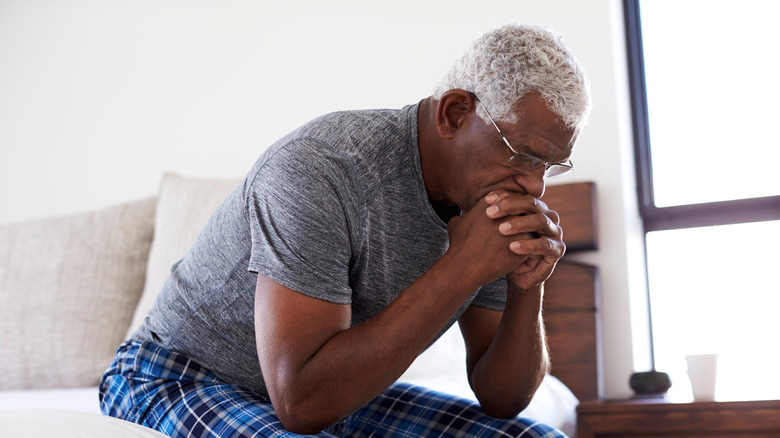Health Mistakes Men Don't Realize They're Making
Biologically speaking, there are fundamental differences between the sexes. Thus, our approach to health must also take those differences into consideration.
Over the last century, Americans have made many positive strides health-wise, with improvements in diet, exercise, and a reduction of vices, according to Harvard Medical School. However, there is still a gap in longevity between men and women. In fact, it's growing. As of 2017, women were outliving men by five years, up a total of three years from 1900. Research also found that men experience more illnesses during their lifetimes, and tend to fall ill at a younger age. While studies have yet to pin down a single, specific reason that explains this, there are a variety of biological, social, and behavioral contributing factors.
Not all hope is lost, however. As more awareness develops around complex health issues, men can use this information to inform themselves about how to better take care of themselves. Whether it's related to diet, exercise, or mental health, here are some of the most common health mistakes men make, and how to fix them.
Skimping on skin care
Men, if your idea of skincare is quickly washing your face with the same bar of soap you used to wash your feet, you are missing out on a whole world of possibilities when it comes to taking care of your skin.
There is no shortage of options available when it comes to skincare, so hopping on this bandwagon won't require much effort. Melissa De Zarate, a celebrity groomer, spoke to Men's Health about the ways men can up the ante in their skincare routine and get a celebrity glow. "Lots of guys don't know the importance of exfoliation and it takes the majority of my time when I'm getting someone ready if they have a lot of dead skin hanging around on their face," she explained. "The easiest way to do it is just using a white wash cloth and hot water and scrubbing your face. You can also use a textured cotton pad with micellar water to buff circles on your face..."
De Zarate also reminds men to use sunscreen daily, as it helps to extend the life of your skin and protect all that hard work you're putting in. Exfoliating your lips with a DIY lip scrub made of brown sugar and coconut oil is also on her list of recommendations.
Not visiting the doctor enough
If you thought the stereotype of the guy whose girlfriend has to drag him to the doctor's office for his annual checkup was just that — a stereotype — the statistics actually show otherwise.
According to reports from The Cleveland Clinic via Everyday Health, out of 500 men that were surveyed about their doctors' visits, only three out of five make it to their annual physical. Additionally, just under 60% reported not going to the doctor at all. So why is that, exactly? More than half of the men expressed that they don't talk about their health, and another 19% admitted that the reason they end up going is so that their significant others would stop bothering them about it. Yikes.
Experts at Everyday Health say that going to the doctor for regular check-ups can help men detect diseases such as prostate cancer, which reportedly affects one out of six men. Furthermore, the site says that men should not be afraid to ask specific questions about their sexual health when they go to visit their doctor to prevent any larger issues that may be hiding behind them. Lastly, don't wait until the last minute after symptoms have gotten out of hand before you see your physician.
Stressing about sexual performance
Judging by what we see in movies and on TV, it seems that performance in the bedroom is a bigger concern for men than it is for women — but is there truth to this commonly held belief?
According to WebMD, sexual performance anxiety is indeed more often diagnosed in men than it is in women. Dr. Emily Jamea, LMFT, LPC, who has worked as a sex and relationship therapist for more than ten years, wrote in Psychology Today that there are a number of reasons to blame for this sex-related stress. One of the reasons she shares is that society as a whole puts a lot of pressure on men to perform sexually, and if what happens in the bedroom doesn't look exactly like what happens in porn, men might suffer from anxiety about letting their partner down.
The key to solving anxiety, Jamea explains, is proper communication between partners. If a man is experiencing performance anxiety despite feeling excited about where his relationship is headed, it might just be "love jitters" affecting his performance. In this case, Jamea suggests talking it out with your partner and expressing how you feel, explaining that the jitters typically subside as emotions are shared.
Not routinely checking their testicles
While certain tests may require a visit to the doctor's office, there are others that can be done from the comfort of your own home. (In other words, there's no excuse for men who don't want to visit the doc for this one.)
Regular testicular checks are important for men to detect any potential problems such as lumps, which could potentially be cancerous (via WebMD). Some sources suggest checking the testicles once a month, while others say a once-a-year visit to the doctor's office may be enough. For those who prefer to self-check, experts at WebMD say it is "quick and painless," and that you should be on the lookout for changes to the "shape, size, and feel" of your testicles.
That said, testicular cancer is quite rare, with a man's chances of having it being one in 250. The chances of dying from it are even slimmer, at one in 5,000 (per WebMD). Some of the symptoms of testicular cancer are a firm testicle, a heavy scrotum, and aches in the lower abdomen and groin. If your doctor finds a lump they find suspicious, they will do an ultrasound test and a blood test.
Not doing enough cardio
The days of men in tight suits sweating it out with Richard Simmons are of a bygone era (for better or for worse). According to the experts at Men's Journal, the reason you are hard pressed to find men in a spin class is because they either find it "boring" or prefer to do quick burst-style exercises in the gym such as lifting weights.
The benefits of cardio for men include minimizing the risk of heart attack and stroke. What's more, only two and a half hours of it are required to meet your weekly goals (as set by the CDC). If you are new to this whole cardio thing and prefer to get in and get out, research suggests that getting your two and a half hours in just a couple sessions can also be effective.
Nader A. Ayub, DO, primary care sports medicine physician at Houston Methodist in Texas, spoke to Men's Journal and explained, "They're starting to show in newer studies that this is actually just as effective in reducing risk of heart attack or stroke as it is for someone who does exercise consistently but at a lesser amount each day."
Not eating enough vegetables
Not to continue harping on stereotypes, but you know the guy who insists on only eating meat and potatoes? Yeah, that one. Well, send him a friendly note and tell him it's time to flip the script.
Rachel Johnson, Ph.D., M.P.H., R.D. and senior nutrition advisor to Eating Well Magazine, explained that there are differences gender-wise in the way we eat. Men typically eat more meat and bread, while women eat more "fruit, yogurt and diet soda." Furthermore, studies show that men are typically more satisfied with their bodies, and thus develop a less restrictive approach to dieting. However, according to a report from the CDC, eating a diet filled with fruits and vegetables is a great way to prevent heart disease, type 2 diabetes, and some cancers.
Additionally, according to Men's Health, for men who are concerned about performance in the bedroom, fruits and veggies can potentially increase your ability to stay erect. Watermelon, pumpkin, and cucumber made the cut on their list of "penis-friendly" fruits and veggies thanks to their high levels of L-citrulline, which research has proven can improve erections.
Not properly grooming their hair and beards
Like your face, taking care of your hair and beard requires more than just a quick lather and rinse of soap. Celebrity groomer Melissa De Zarate who spoke to Men's Health about skincare, also has some tips on how to best take care of your hair.
Starting with beards, De Zarate explains "Guys don't condition their beards enough. You've got to soften it up and make it touchable! It's especially important in the winter when hair gets dry so easily. Massage in a little bit of beard oil at least every other day to keep it lush. If you don't have beard oil, go to the kitchen and use a teaspoon of olive oil. You can use coconut oil, too, which is non-comedogenic (meaning it won't clog your pores), but not everyone wants to smell like a coconut, so olive or avocado oil will work, too..."
For those who skip out on conditioner, or worse, use the dreaded 2-in-1 shampoo and conditioner (you know who you are), not so fast. Deep conditioning your beard and your hair at least three times weekly for five minutes is an excellent way to keep your hair "soft and touchable," according to de Zarate.
Not practicing self-care
It's understandable: To some, lighting candles and namastaying your way through a rough day might seem a little ... girly. However, self-care doesn't necessarily have to mean long, drawn-out baths and mani-pedis (although they're arguably a great part of that).
Dan Doty, the co-founder of EVRYMAN, a group dedicated to helping men lead more successful and filling lives, spoke to Healthline about "normalizing self-care for men," as he refers to it. He suggests looking at self-care not only as a way to help heal yourself, but also as a way to make life easier for those around you as well. He said that focusing on your wellbeing first "heightens your ability to perform at work, improves the harmony of your families and relationships, and greatly increases your ability to achieve your goals." He also highlights developing a sense of worthiness as motivation to develop a self-care routine.
In another article for Healthline, Doty focused on the importance of getting substantial rest in order to avoid burnout. He suggests starting by committing to a full night's rest every day for a week, and keeping a journal to track how you are feeling. He adds that getting a massage, taking a vacation, and taking time to "literally do nothing" are other great ways to learn to unwind.
Eating extra large portions of processed foods
While it's true that men do need more calories than women, it doesn't mean that downing extra large portions of steaks, fries, and milkshakes while your female companion munches on a salad will keep you within a healthy range.
If you are interested in losing weight or just keeping it off, controlling your portion sizes and balancing your take of fruits and vegetables with meat, as mentioned earlier, are the way to go. San Francisco-based nutritionist Manuel Villacorta, RD, founder of the weight management website EatingFree.com, spoke to WebMD and explained that eating three meals a day at approximately 700 calories each is ideal. An example of such a diet might include starting the day off with a "power breakfast" of oats, blueberries, and walnuts, followed by a lunch and dinner of salmon or other lean meat balanced with veggies or brown rice. Villacorta also gave a thumbs up to apples and other healthy foods as snacks.
Villacorta added that with this type of diet, it is actually okay to eat a little more. "People think that dieting means eating less; they envision hunger. But if you move from steak and potatoes to fruits and vegetables, you can actually eat more," he explained.
Drinking too much
The cliche movie scene of a man "throwing one back with his buddies" is one that most audiences are both endeared by and familiar with. However, what may appear to be casual on the surface hides a somewhat sad tale underneath.
According to Health, research has shown that the reason some men drink more than women is because it's easier for them to connect to other men's happiness. The study referenced was published by Clinical Psychological Science, and measured what researchers called emotional contagion. It found that when both men and women were observed in social settings, women with or without alcohol were able to mirror smiles back to other group members. The men, however, did not fare so well. Findings showed that for men, drinking increased the likelihood of sharing smiles by 30%. The research also found that men were 50% more likely to binge drink than women, and experienced a greater number of alcohol-related problems than women as well.
This data is backed by the CDC, which reports that 59% of men surveyed admitted to drinking in the last 30 days compared to less than 50% of women. The CDC explains that drinking can be related to "injury, violence, and other harms," and can also negatively affect men's reproductive health.
If you or anyone you know is struggling with addiction issues, help is available. Visit the Substance Abuse and Mental Health Services Administration website or contact SAMHSA's National Helpline at 1-800-662-HELP (4357).
Being afraid of carbs
By now, most people are probably aware of diets such as keto, paleo, and Atkins, which either limit or completely restrict most forms of carbohydrates. These diets generally have the intention of helping you speed up weight loss and can actually be beneficial for your health (via Healthline). However, taking this extreme approach by avoiding carbohydrates entirely may actually hinder your health and fitness goals, according to Men's Health.
To start, it helps to actually know the role that carbohydrates play in our health. Carbs are macronutrients that help keep your metabolism going. Dr. Donald Layman, a professor of human nutrition from the University of Illinois, explained it thusly: "Carbohydrates are the only nutrients that exist solely to fuel the body." According to The Dietary Guidelines for Americans via Mayo Clinic, carbohydrates should comprise 45% to 65% of your total calories per day.
In addition to focusing on how many carbs you're eating, you should also focus on what kind of carbs you're eating. Complex carbohydrates are typically seen as the best, because they break down slower and release glucose more slowly into the bloodstream. Examples of complex carbs to add to your diet include fruits, vegetables, beans, and whole grains (via Healthline).
Smoking
While by and large, Americans are smoking in fewer numbers today than in previous years, smoking continues to be a habit for 14 out of 100 American adults and is the leading cause of preventable disease (via CDC).
However, according to reports from the National Institute on Drug Abuse, men are unfortunately leading the way in tobacco addiction. A survey conducted in 2015 saw that 16.7% of males smoked cigarettes compared to 13.6% of females. Furthermore, according to research that studied the neurological pathways in both men and women, smoking triggers the reward pathways in men's brains more so than in women's. The findings also suggest that for men, smoking is more of a reinforced habit than one used to regulate mood.
According to the CDC, the dangers of smoking include cancer, heart disease, stroke, lung diseases, and many more. If you smoke and find yourself wanting to quit, the CDC mentions counseling and medication as two effective ways to help kick the habit.
Taking too many risks
Being a daredevil may have been adorable when you were a kid, but as an adult, it can land you in some tricky situations.
If you are frustrated from biting your nails as the men in your life take some rather uncalculated risks, perhaps you can go a little easier on them knowing that their brain function is likely to blame. In a study published by Psychology and Counseling, researchers set out to understand just what happens to the brain when we make decisions under stress. The study found that acute stress actually contributes to you making decisions that were previously rewarding, but impairs your ability to avoid decisions that may have been previously negative. It also showed that — yep — males take more risks when they are under stress. This happens because of activity in certain brain regions that control risk taking and preparation of action.
Another study published by the American Psychological Association examined gendered differences in risks, and found that men are more attracted to risky behavior than women in the areas of gambling, recreation, and health. So the next time you feel like hitting up the casino or taking any other sort of daredevil leap of faith, pause to consider the pros and cons before taking action.
Bottling up feelings
While to some men, it might not seem like a big deal, keeping your feelings inside can actually cause considerable harm in the long run.
According to Healthline, mental health issues have the potential to affect men just as much as women, but because of gender stereotypes, men may be less likely to reach out if they need help. In 2019, statistics showed that men in the U.S. died by suicide approximately 3.7 times more than women. The site says that it isn't just hormones that affect the way mental health issues play out in men — coping strategies, experiencing gender stereotypes, and even clinical bias have also contributed. Some ways mental health issues may manifest differently in men include displays of anger and aggressiveness, frustration, irritability, and engaging in high risk activities among others.
Dr. Elena Touroni, a consultant psychologist and co-founder of The Chelsea Psychology Clinic, explained to Healthline that "men can find it more difficult being open about their mental health and seeking support because it's likely to go against the kinds of messages they received growing up." If you think you are struggling with mental illness, reach out to a doctor, research support online, and try opening up to a friend.
If you or someone you know is struggling with mental health, please contact the Crisis Text Line by texting HOME to 741741, call the National Alliance on Mental Illness helpline at 1-800-950-NAMI (6264), or visit the National Institute of Mental Health website.

